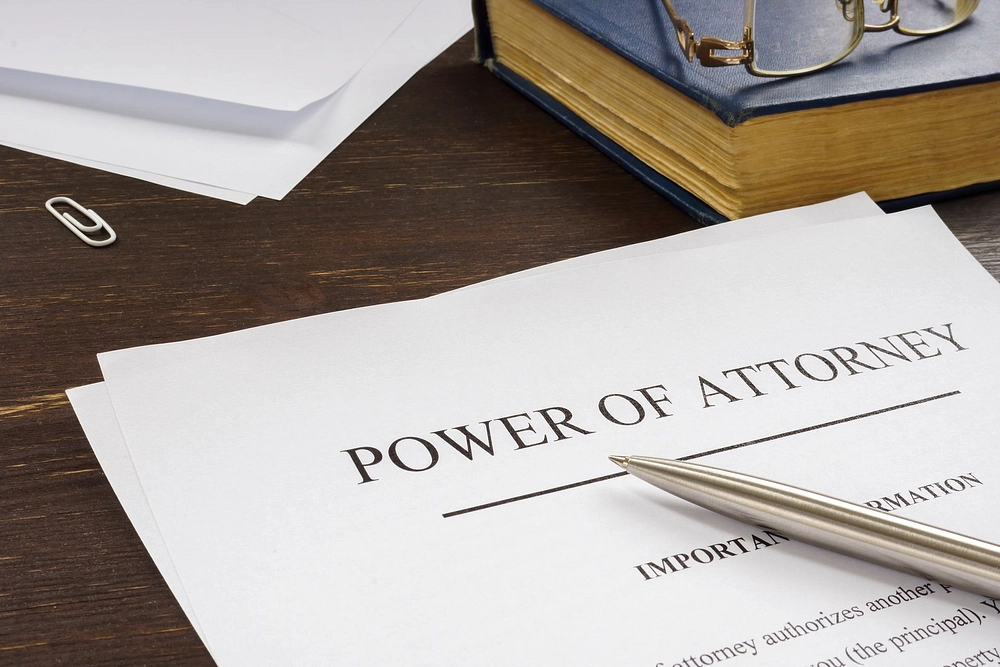Signature Collection
Explore SignatureThe United Arab Emirates is rapidly growing as a global economic powerhouse, in which the region’s thriving real estate market plays a crucial role. The government has introduced various measures to streamline processes and ensure efficiency, including using a power of attorney for real estate transactions. This legal instrument empowers individuals to conduct property-related activities seamlessly. Our comprehensive guide will explore what a power of attorney for property does, its types, application process, advantages, and associated risks.
What is the Power of Attorney for Property?
A power of attorney for real estate transactions in the UAE is a legal document granting an individual or organization the authority to represent and act on behalf of the nominee. This authorization is particularly significant in real estate dealings and is invaluable for those unable to physically process property transactions.
Types of Power of Attorney for Real Estate Transactions in the UAE
The agent’s authority depends on the language used in the document. Some POAs are specific and only grant authority for certain actions, while others are more general and encompass many activities. Here are the types of power of attorney for property and their authority.
General Power of Attorney for Property
- Grants broad powers to the assigned attorney for various tasks on behalf of the nominator.
- Includes executing legal duties, signing contracts, collecting rental income, paying utility bills, and representing the nominee in legal affairs.
Special Power of Attorney
- Provides limited power for specific, one-time issues, with authority revoked upon task completion.
- Issued for a particular time and explicit transaction, offering a low-risk option for specific situations.
Property Power of Attorney
- Specifically designed for property-related processes, such as signing sales purchase agreements, buying or selling properties, and obtaining Non-Objection Certificates (NOCs).
- Empower the nominated attorney to represent the client in legal proceedings related to real estate.
Role of Power of Attorney for Property
The role of a power of attorney in property matters is significant and can be broad or limited, depending on the terms specified in the document.
Here are some common aspects of a power of attorney related to property:
- You can have a power of attorney for the sale of property. The agent can also manage rental properties, including negotiating leases, collecting rent, and handling tenant-related matters.
- They can handle mortgage-related matters, such as applying for a mortgage, making mortgage payments, or refinancing. The agent can be responsible for paying property taxes and dealing with related financial matters.
- The agent can be authorized to arrange for property repairs and maintenance. Handling utility bills and related matters.
POA may have the authority to transfer property ownership on the principal's behalf and may be empowered to make real estate gifts or donations on the principal's behalf. - A power of attorney can represent the principal in property-related legal matters, such as disputes or lawsuits. They can also handle property insurance matters, including filing claims and receiving settlements.
Who can be nominated for POA for Property?
Family members, relatives, friends, or attorneys can be nominated for a Power of Attorney to sell property in Dubai or any other Emirate. General Power of Attorney requires the nominee to be an immediate family member. At the same time, a Power of Attorney for real estate transactions allows the nomination of individuals outside the family circle, subject to specific application.
You can also hire any reputable real estate broker and use their conveyancing services in Dubai. These real estate agents in Dubai can handle property transfers and other processes on your behalf.
How to Obtain a Power of Attorney in the UAE
The process involves fulfilling legal requirements, including document preparation, notarization, and legalization. The document must be issued in both English and Arabic. A public notary must notarize the power of attorney paperwork. If it is issued abroad, it must be approved by the UAE embassy and the Ministry of Foreign Affairs. The validity period varies between types, with a general power of attorney typically valid for two years.

Advantages of Power of Attorney for Real Estate Transactions
- Provides a practical way to handle tasks remotely without being physically present in the country.
- Saves time, money, and effort for individuals and businesses involved in real estate processes.
- Enables representation for those unable to personally attend real estate proceedings.
- Facilitates property transactions for individuals abroad, with hired attorneys managing the entire process.
Risks Associated with Issuing a POA for Property
While the government ensures buyer and seller protection, there are inherent risks in granting someone a power of attorney for property. The power of attorney plays a pivotal role in the UAE's real estate transactions, offering convenience, efficiency, and representation for various stakeholders. As the property market continues to thrive, understanding the nuances of POA for property is essential for those engaged in real estate processes in the UAE.
Whether buying, selling, or managing property, navigating the legal landscape with the right power of attorney can make all the difference in ensuring a smooth and secure transaction. Stay informed, seek professional advice, and empower yourself in the dynamic world of UAE real estate.
Before granting a power of attorney for property, individuals should carefully consider the scope of authority given to the agent and ensure that it aligns with their wishes and intentions. Legal advice and consultation with a qualified attorney are recommended when creating or dealing with a ower of attorney to ensure that it meets legal requirements and adequately addresses the principal's needs.
FAQs about Power of Attorney for Property
The key individuals in this context are the grantor, the property owner providing authority, and the agent or attorney-in-fact, the person entrusted with carrying out property-related decisions on behalf of the grantor.
In contrast to a general power of attorney, which empowers lawyers in Dubai to handle various transactions like buying, selling, or managing real estate properties on behalf of the principal, a special power of attorney (SPOA) specifically confers lawyers with the authority to act in particular situations. SPOA is typically utilized for specific, often urgent transactions or dealings that require immediate attention.
An irrevocable power of attorney is a power of attorney that the principal cannot revoke. Signing irrevocable power of attorney is not permissible in Dubai; however, it is allowed in other emirates such as Abu Dhabi and Sharjah. Each type of power of attorney may come with additional requirements, depending on the department utilizing them.
A continuing Power of Attorney for property is a legal document that grants an individual, known as the agent or attorney-in-fact, the ongoing authority to handle specific property-related matters on behalf of the principal. Unlike a general Power of Attorney, which may become invalid if the principal becomes incapacitated, a continuing Power of Attorney remains in effect even if the principal is unable to make decisions.
The sale of property through power of attorney is not valid unless explicitly authorized to do so within the document.
For more information, get in touch with us at Provident
 Apartments
Apartments Villas
Villas Townhouses
Townhouses Penthouses
Penthouses Commercial
Commercial See All Properties
See All Properties Commercial
Commercial Property Management
Property Management List Your Property
List Your Property Mortgages
Mortgages Conveyancing
Conveyancing Short Term Rentals
Short Term Rentals Property Snagging
Property Snagging Partner Program
Partner Program Currency Exchange
Currency Exchange PRYPCO
PRYPCO Ethnovate
Ethnovate Plots
Plots

